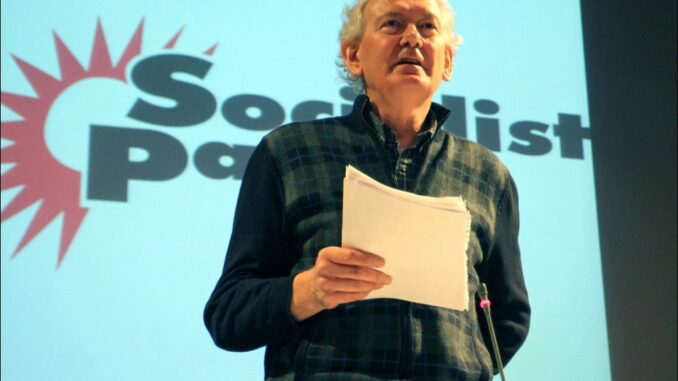
Lynn Walsh died on November 15th aged seventy-nine. Born and brought up in the south of England, he began studying at Sussex University in 1964. Lynn soon joined our small but growing group of revolutionary Marxists – inside the Brighton Labour Party, in its youth section and in the University’s Socialist Club. Our newspaper, Militant, was launched in October of that year, just before a Labour government was elected under Harold Wilson.
Lynn showed great enthusiasm for our ideas and those of the great teachers – Marx, Engels, Lenin and Trotsky. He had considerable talent in terms of writing, speaking, and debating. This had shown early on when, via Sussex University, he was voted into the national leadership of the Revolutionary Socialist Student Federation – an organisation that had mushroomed under the impact of the May 1968 revolutionary events in France. The Revolutionary Socialist Student Federation’s existence was short-lived, but it was initially sizeable and, as Bob Labi recalls, Lynn played a prominent role arguing for our views and cut his political teeth in what were sometimes fierce political debates.
After leaving Sussex, Lynn spent time based in London, developing the work of our growing organisation. In the early 1970s he moved to Manchester to work as one of the first regional full-timers for Militant. As well as reporting on local strikes and struggles, Lynn contributed important articles to our theoretical magazine, on national, international and historical issues.
When revolution broke out in Portugal, in 1974, Lynn was sent by our newly-founded organisation – the Committee for a Workers’ International – to build a base there for our ideas (with almost no knowledge of the country’s language!).
Back in London, Lynn became an invaluable writer and editor of the Militant’s publications. He was also involved in important legal battles, working closely with friend and solicitor, Mike Fisher. This included the Labour Campaign for the Defence of Brixton, set up in response to the 1981 ‘riots’, and later several others, such as the victorious battle against the then right-wing leaders of Unison’s attempt to witch-hunt four Socialist Party (CWI England & Wales) members. Lynn lived with his partner Vivien Seal, and son, Daniel, just at the top of Brixton Hill, in a house often used for meetings of local Militant comrades.
Along with the other four of us on Militant’s Editorial Board – Peter Taaffe, Keith Dickinson, Ted Grant, and myself – Lynn was ‘put on trial’ by Labour Leader, Neil Kinnock, and the party’s National Executive Committee. At the 1983 Labour Party Conference (in Brighton, as it happens), we were expelled from the Labour Party. (The following year, 1984, Lynn’s son, Daniel, aged seven, was presented with a prize by Neil Kinnock for a drawing he had done about the Health Service. Daniel promptly asked him why he had expelled his father from the party!)
In the 1980s our organisation in Britain had grown to beyond 8,000 members and we held a major rally in Alexander Palace. At this time, Lynn was an important contributor to the major debates we had nationally and internationally. Lynn also provided important advice and a Marxist theoretical grounding for our student comrades, as Militant grew in strength nationally in that field of activity in the ’80s. He took a clear position during the split in the CWI in the early 1990s and was the key editor of our theoretical journal – Militant International Review – and then of its successor, Socialism Today.
Committee for a Workers’ International
Increasingly involved in the CWI’s activity, Lynn visited a number of countries on its behalf, including South Africa, with Tony Saunois, as well as India, Sri Lanka, Pakistan and, many times, the US. He spoke at numerous debates and meetings on behalf of the CWI. I particularly remember when he visited the USSR in its turbulent dying days. He addressed a meeting in the capital, Moscow, and then a gathering of 50 people in Leningrad, in the very same ballerina’s house that the Bolsheviks used in April 1917.
The new period that then opened as a result of the collapse of the Soviet Union and other Stalinist states, saw wide-ranging debates amongst Marxists, in which Lynn prominently participated – on global relations, the economy, the class character of China, the European Union, the role of a revolutionary party, and on tactics for building the workers’ movement. Lynn also covered the work of the southern region of the Socialist Party during this period.
Not long into the 21st century, Lynn’s life moved all too rapidly from sheer delight in his partnership with Lorraine Dardis, who had moved to London from the US, into the tragedy that ensued with her terminal illness and untimely death. Lynn suffered increasing serious health problems, including failing eyesight, becoming increasingly dependent on the unstinting help of friends and, in particular, that given by his comrade-neighbours, Roger and Elizabeth Keyse.
During Lynn’s last years, when he was once more in Brighton, where Daniel was living, Lynn was no longer able to be active politically. He had visits from family and close friends, like Nick Chaffey from Southampton, and, on one last occasion, in 2023, Jagadish Chandra from Bangalore, India.
Those of us who knew Lynn well for many decades – who worked with him, visited the theatre and concerts with him and (very occasionally) clashed with him – will never forget Lynn or his contribution to the building of the forces of Marxism and Trotskyism nationally and internationally. Many newer members of our party and the CWI who never met Lynn nonetheless gain enormous benefit from his written material.
